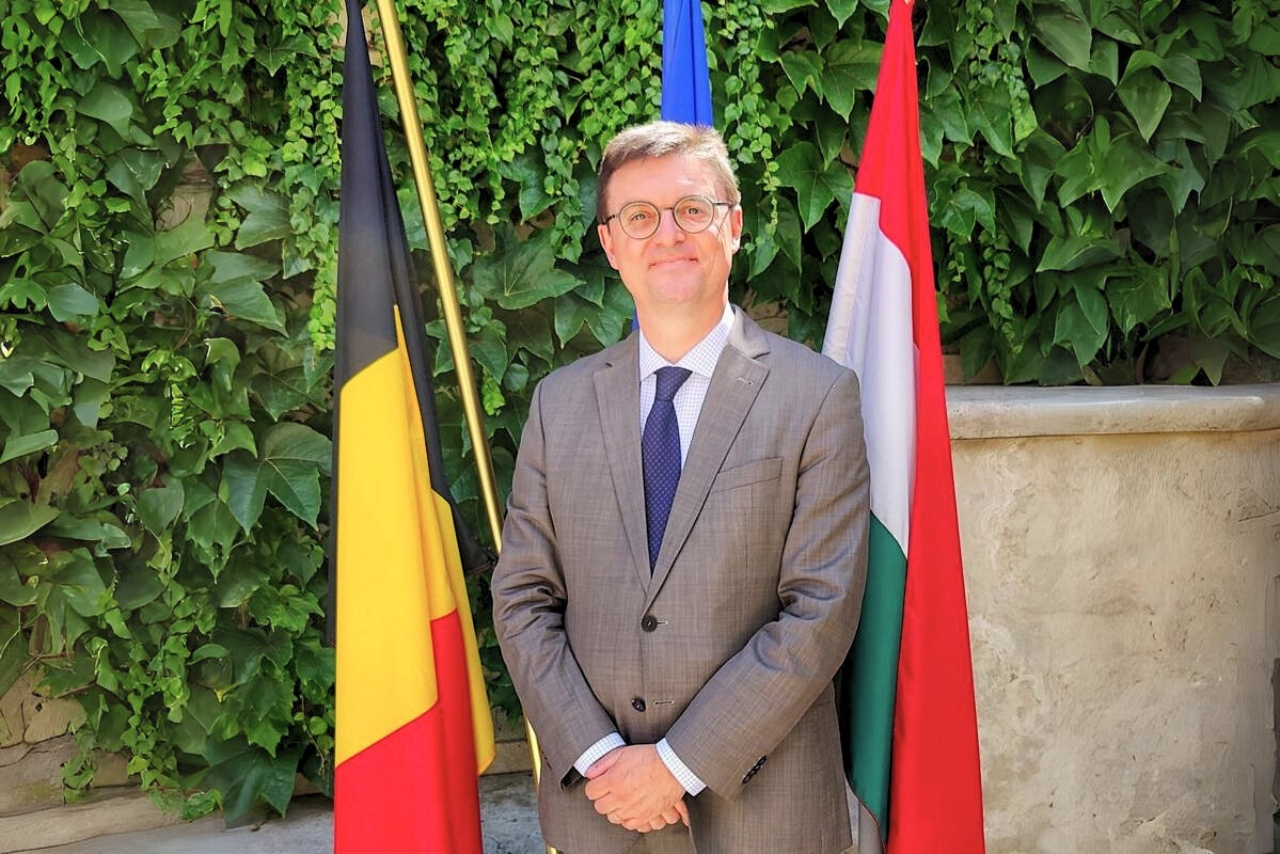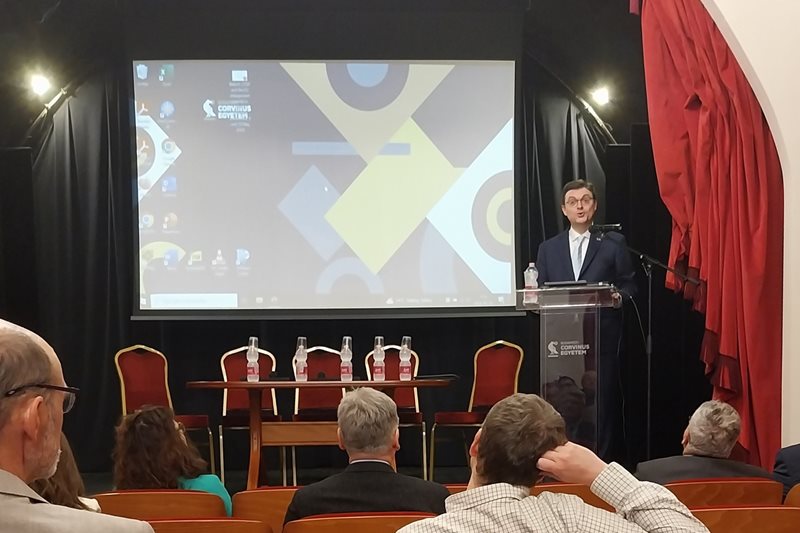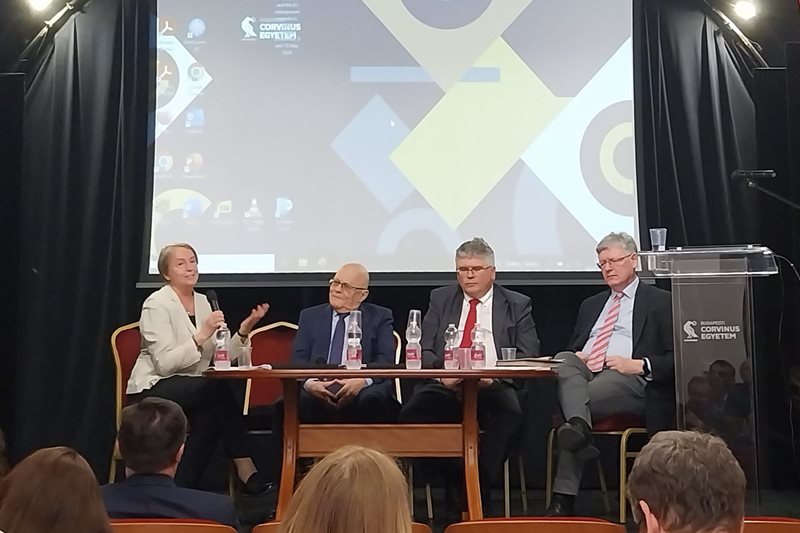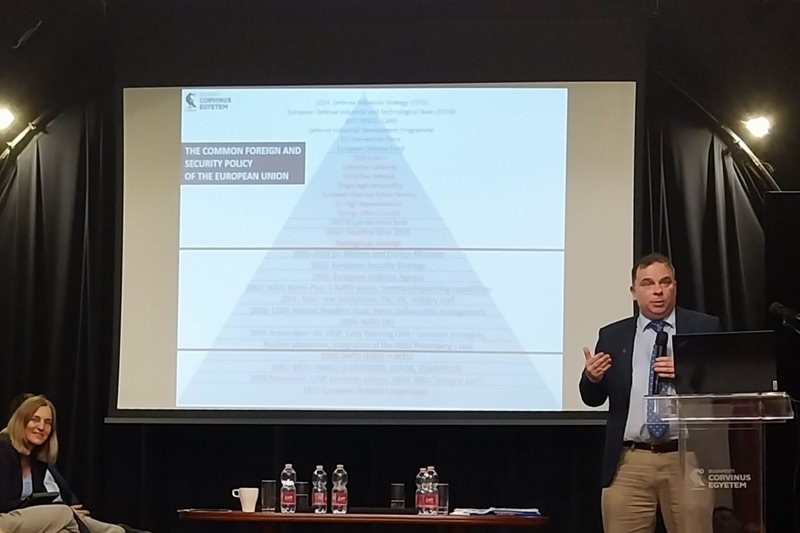“The greatest EU achievements are those that we no longer notice because they have been part of our lives”

In her welcome speech, Ágnes Szunomár, Head of the Institute of Global Studies of Corvinus, pointed out that the conference was the first joint professional event of the two departments of the Institute – the International Relations and the World Economy departments. She then briefly outlined the programme and mentioned as a special feature that students were invited to co-organise the event: one of the panel discussions was the result of the work of the College for Advanced Studies of Diplomacy in Practice of Corvinus.
“There is always room for compromise because we have no other choice”
The opening speech was delivered by H. E. Jeroen Vergeylen, Ambassador of Belgium to Hungary, who began by wishing a happy Europe Day in Hungarian, and then recalled the Schuman Declaration on a Europe without war, issued on this day in 1950. He said that, although for a while we thought we had achieved our goal, this was an illusion, today the threats to peace in Europe are greater than ever and a huge creative effort will be needed to preserve the Union. He said that for the Member States that joined the EU in 2004, full membership did not mean a return to Europe, as they have always been and will remain European, but an anchoring in freedom, democracy and the rule of law, which opened a new page, a new opportunity for the future. He added that without the Iron Curtain, these countries would have been part of earlier chapters of integration. He recalled several points of common ground in Belgian and Hungarian history, i. e. the Magyar raids on monasteries in the Middle Ages, the Habsburg dynasty, humanitarian aid during the wars, refugees received after WWW2 by Belgium, the art nouveau, and the investments coming from Belgium to Hungary.
The Ambassador stressed that 2024 is an important year for both Belgium and Hungary, as the two countries hold the Presidency consecutively in the first and second half of the year. He noted that this is the 13th time that Belgium holds this position, and one of the lessons is that no two presidencies are the same, and that every presidency brings challenges and even crises. Another lesson is that we have only been able to overcome challenges by working together with other member states, the EU institutions and our global partners in a true European spirit. “Our priority is to let the EU work. We Belgians know there is always room for compromise because we have no other choice,” said Vergeylen. He added that the motto of their presidency is to work for a Union that can protect its citizens, strengthen its economies and prepare its members for the future. “This is particularly important now, when everyone feels that the EU is at a crossroads. We are facing war on our borders, we are firmly behind Ukraine and we continue to face the consequences of past and current crises.”
Five expectations of the Belgian Presidency towards the Hungarian Presidency
The diplomat said that the Belgian Presidency, which is now coming to an end, has been able to finalise agreements between the Council and Parliament on 67 legislative dossiers. These can be grouped around six main themes: defending the rule of law, democracy and unity; boosting competitiveness by deepening the internal market and strengthening industry; pursuing a green and just transition; strengthening the social and health agenda; protecting people and borders; and promoting a global Europe. In the remaining two months, they will focus on strategic issues, including the roadmap for the 2024-29 cycle and, looking further ahead, the enlargement perspective of the Union and its own reform and future. He said: “If well managed, enlargement can strengthen our prosperity, security and open strategic autonomy. At the same time, compliance with the accession criteria, the so-called Copenhagen criteria – in particular, respect for the rule of law and democracy – remains a crucial element in joining the EU.”
At the end of his speech, the Ambassador spoke about the expectations regarding the Hungarian Presidency from a Belgian perspective. As Hungarian diplomats and officials are well prepared,a smooth transition and a well-organised presidency are expected. Belgium expects the Hungarian Presidency to take forward work on competitiveness and the defence industrial strategy. EU presidency should help to establish the rules for implementing the migration and asylum pact, closely monitor support for Ukraine, continue enlargement negotiations and internal reforms in the EU.
In the question-and-answer session, the autonomy of the Presidency as a decision-making institution was the first issue addressed. The ambassador said that the presidency is shrouded in a myth that it can decide everything, but this is far from being the case, 90 percent of its agenda is already set and it only has room for manoeuvre in the remaining 10 percent. For example, in the previous trio presidency, Hungary insisted that demographic change should be one of the priorities, and it was included in the agenda.
There was another question from the audience about the deliverability of one of the expectations of the Hungarian Presidency, the migration pact, which the Hungarian government has made clear it does not intend to implement. The response was that the pact had been accepted and that what we hear in public statements does not always match what is done behind closed doors. It is the task of the presidency to coordinate the legislative work and it is another question whether Hungary itself will implement the final result, but the ambassador said the Hungarian presidency will act responsibly.
Panel of Hungarian expert diplomats
The conference continued with a round table discussion. Moderated by Erzsébet Kaponyi, Professor Emerita of Corvinus, the roundtable was attended by diplomats who have been actively involved in Hungary’s EU accession process and are alumni of Corvinus (its predecessor institution): former EU Commissioner László Andor, former Foreign Minister and EU Commissioner Péter Balázs, and Zsolt Becsey, Deputy Head of Mission of the Permanent Representation of Hungary to the EU, who was Secretary of the Hungary-EU Association Council at the time of accession.
Péter Balázs said that the pre-accession was a very active and intense period, especially at the end, because the most sensitive issues were left until then. Regardless of party affiliation, Hungarian governments were in full continuity in the negotiations. He recalled that he had been entrusted with the task of setting up Hungary’s permanent representation in Brussels, from the choice of buildings to the planning of the internal organisation. They started off with great enthusiasm and high hopes, but after accession they lost their strategic direction, Hungary had not figured out where to go next. The internal dynamics of the EU changed, from a 15-person “board meeting” atmosphere to a 25-member “general assembly” mood, and no one could guarantee the transparency and good spending of the money that was spent. He added that to this day he is still looking for the real answer as to why it was the two pioneering accession countries – Hungary and Poland – that started to act against EU standards and norms after a while.
Zsolt Becsey pointed out that Hungary has been at the forefront of Western integration, i. e. Hungary was the first to apply for membership of the OECD, NATO, and the first to apply for membership of the Union. He recalled that after accession, Member States initially worked as if the new members had not been there. “In the first year and a half we had to prove that we were ready to do the job and competent in our work. That was when I got the tax issues because the tax commissioner was Hungarian, László Kovács,” he said. He looks back on it as a good memory, no problems arose during the transition period. Mr Becsey also said that looking back, one should not limit oneself to the net balance with the EU budget, although Hungary generally has one of the largest positive balances. He said that since 2004, politicians on both sides of government have focused only on spending the money somehow, rather than on how the money is spent, what comes afterwards, and whether it is economically viable to run the investment.
László Andor referred back to the Ambassador’s speech in agreement, saying that the accession brought Hungary and Belgium closer together as one country, because it was very important for everyone who had the opportunity to work there. He shared his personal discoveries about other points of common ground between Belgium and Hungary, such as the Bartók statue in Brussels or the grave of Anna Kéthly there. He mentioned a survey from the turn of the 2000s, which showed that the EU was still most popular in Hungary, with Hungarians expecting the most from EU membership. Referring to his former foreign minister János Martonyi, he recalled that the single market principle was a very sensitive subject of negotiation, and its introduction required a degree of gradualism to avoid shocks. After the opening of the single market, the resulting imbalances in capital and labour were much greater in several countries. Hence there might have arisen a feeling of countries that became capital- and labour-deficient in the integration process that they did not achieve as much as their peers.
It is good that we have become European in spirit
Asked what they consider the greatest achievements of the past twenty years, Péter Balázs said that the greatest achievements are those that we do not even notice because they have become part of our lives, such as free movement within the EU. For Zsolt Becsey, the greatest achievement is that Hungarians have become Europeans for Europeans, both legally and perhaps halfway spiritually. They did not become second-class members, and the transition was quick and normal. “Hungary can swim in deep water, it can swim, so it shouldn’t be afraid that there is no waist ring; so it shouldn’t return to dirigisme, to etatism”, he said. László Andor said that many areas had improved, but there was also a sense of lack, for example, the euro had not yet been introduced, and there was still a gap between East and West in terms of wages and social dialogue. What is very positive for everyone, he said, is relations with neighbours and integration cooperation, which is a specific Hungarian perspective on the importance of EU integration.
Erzsébet Kaponyi concluded the programme with the wish that Hungary should again be more enthusiastic and pro-European, whose citizens want deeper integration, because that would bring a better future for all Europeans. She expressed her hope that the exchange of views would continue in 5-10 years.
The conference continued with thematic debates on the foreign and security policy of the European Union, populism and euroscepticism, the rule of law, and the 25 years of Economic and Monetary Union. The student panel discussed the role of Central and Eastern European countries in the EU and the place of the EU in the lives of young Hungarians.
Portrait credit: LinkedIn


